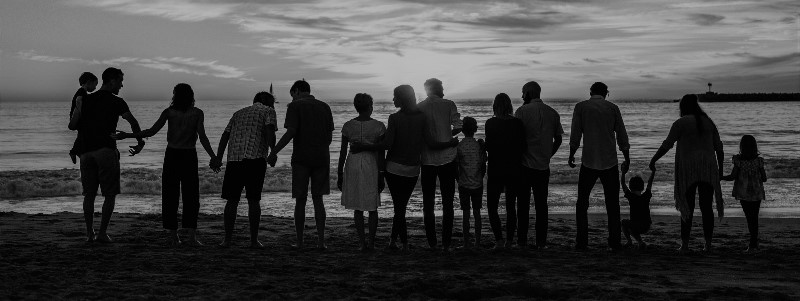The family is our first social group. It is the crucible in which our passions are born and our capacities to love and to live are shaped – and misshaped. The family imbues its members with its own specific culture, habits and attitudes.
As an organism, it too is shaped by the cultural moment and the social environment, the hopes, fears and attitudes of the day. It is the bedrock of our most durable and intense emotions and the fertile soil of our satisfactions and discontents. The family reconfigures with each new life that enters and exits. Constantly changing, constantly staying the same it is both dynamic and flexible, coded and predictable. We are all indelibly touched, one way or another by its authority. We learn to love in the context of ‘family’, each in our own idiosyncratic way. Every family has its own cast of characters ((step)parents, grandparents, (step) siblings, aunts, uncles etc). All players in a unique drama. Family is a stage where universal themes are navigated, power, sex and money, hierarchy and democracy, passion and ambivalence, in all their dark, tumultuous, devastating and innocuous glory.
Universal themes
From Greek myth to Shakespearean tragedy, the depths and breadth of family relations provide a turbulent, brooding backdrop to moral, ethical and philosophical considerations of a universal scale. So often in these epic tales, we are reminded what an unruly emotion love is, indeed how uncomfortably close it resides to its shadowy counterpoint hate. Disowning his most beloved youngest daughter Cordelia, King Lear in a fit of vanity and rage is consumed by vengeful hate, abdicating love and reason in its wake he casts her out. Her failure to satisfy his insatiable need for flattery and primacy, to go against her own nature, disrupts their bond, unleashes chaos and eventual tragedy. This is an epic tale of family conflicts, of power, love and greed. Most family dramas do not play out on such a grand scale, but remain hidden in the shadows of secrecy, shame and trauma, creating a legacy that can trickle (or cascade) down through generations to come.
Changing Families
Whilst the major human themes endure in families across generations, the architecture of family life and living is continually changing with the socio-political and economic tides. Every generation spawns its own raft of experts on the family and its constituent members, from the institutions of religion, state, medical and social science and philosophy. The current moment, in particular, is one in which the couple is the central organising pillar upon which the success of the family depends. Bred in ever smaller numbers, the modern child is also a major focus of scrutiny and opinion. As the birth rate has decreased so children’s value has increased. Parents invest heavily in their offspring financially, emotionally, educationally etc. We dedicate ourselves to their health and happiness, often discounting our own in the process. As an antidote to our high tech fast-moving, demanding lives we create a utopia of childhood and perhaps (without knowing) locate many of our own unmet hopes and passions in our beloved and precious innocents.
Love them or hate them (and indeed it is within our families that we learn about both) idealise or reject them it is within the context of the family that we learn about the social world and our place in it. It is in this original grouping that we have our first experience of grief and loss, it is where we learn to trust (or not) and to express (or inhibit) our desires. Family life is fraught with misunderstandings and pain and is the vessel in which our virtues are forged, kindness, loyalty generosity and fortitude. Interestingly, even when we grow up and leave them we will most often seek out another with whom we wish to form a family. At this very particular COVID moment, we are all forced to reconsider what family means to us.
To enquire about psychotherapy sessions with Gerry Gilmartin, please contact her here, or to view our full clinical team, please click here.
Gerry Gilmartin is an accredited, registered and experienced psychotherapeutic counsellor. She currently works with individuals (young people/adults) and couples in private practice. Gerry is available at our Brighton and Hove Practice.
Further reading by Gerry Gilmartin
Fear and hope in the time of Covid
Relationships, networks and connections

Leave a Reply